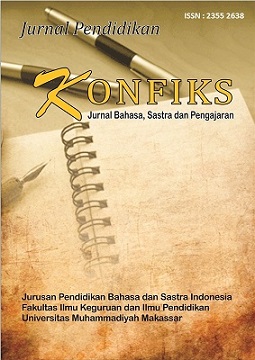NATIONAL VALUES IN JARAN PEGON KEDIRI CULTURE
DOI: https://doi.org/10.26618/konfiks.v12i2.17857
national values, jaran pegon, javanese culture
Abstract
Along with the development of the times, national values are increasingly eroded by foreign cultures that easily enter Indonesia. An example of the influence of foreign culture is the Korean Wave, which Indonesian teenagers widely love. This is caused by the weakness of national values possessed by the young generation in Indonesia. National values themselves need to be instilled from an early age until adolescence to avoid various problems that often occur in the teenage environment, such as the decline in politeness and the forgetting of Pancasila values among teenagers. National values need to be instilled by utilizing various available media. One of the media that can be used is the Jaran Pegon art, which still has many fans to this day. Therefore, this study aims to explain the national valuescontained in the Jaran Pegon culture, which is typical of Kediri. This study is classified as qualitative research, utilizing interview techniques with relevant parties to gather the necessary information. The results obtained from this study reveal the presence of strong national values, such as divinity, unity, and patriotism, in the art of Jaran Pegon and Javanese songs used within this art form. With many enthusiasts spread across Kediri and its surroundings, Jaran Pegon has the opportunity to instill national values in the general public through its performing arts.
References
Afrilihadi, AR, Sumadi, T., & Nadiroh, N. (2025). Sekolah sebagai Laboratorium Kewarganegaraan di Era Digital: Tinjauan Pustaka. Jurnal Pendidikan Moral Dan Kewarganegaraan, 9(1), 48–59.
Amirulloh, I., Anam, M. S. I., Mujito, M., Suwito, S., Saputra, R., Hardyansah, R., & Negara, D. S. (2023). Implementasi Nilai Persatuan dalam Bergotong Royong di Masyarakat Desa Anggaswangi Sukodono Sidoarjo. Economic Xenization Abdi Masyarakat, 1(1), 13–20.
Apriyani, T., & Nalurita, B. A. Y. (2023). Nilai Kebangsaan pada Karya-Karya Leila S. Chudori. Diglosia: Jurnal Kajian Bahasa, Sastra, Dan Pengajarannya, 6(2), 375–388.
Awaliyah, F., Aisiyah, A., Putra, F. E., & Santoso, G. (2022). Peradaban Patriotisme dan Nasionalisme; Generasi Muda sebagai Landasan Pembangunan Karakter Bangsa. Jurnal Pendidikan Transformatif, 1(3), 62–72.
Budi, B., Prakoso, L. Y., & Risman, H. (2021). Strategi Pemerintah Dalam Mewujudkan Nilai-Nilai Persatuan Indonesia Dalam Mengatasi Konflik Berbangsa Dan Bernegara Dari Perspektif Strategi Perang Semesta. Strategi Perang Semesta, 7(2), 85–98.
Cahyani, A., & Sugito, B. (2018). Kreasi Karya Tari Jaranan Sanjoyo Putro Desa Bandar Kidul Kota Kediri. Solah, 8(1).
Cahyani, A., Santoso, M., Baihaqi, M. I., & Putra, M. R. (2024). Aktualisasi Nilai-Nilai Pancasila Dalam TradisiJaranan “Turonggo Cahyo Budoyo” Kabupaten Blitar. Edu Sociata: Jurnal Pendidikan Sosiologi, 7(1), 739–751.
Christiani, P. K. I. (2024). Jaranan Pegon Rukun Budaya Pada Ritual Adat Bersih Desa Di Kelurahan Blitar. JISOSEPOL: Jurnal Ilmu Sosial Ekonomi Dan Politik, 2(2), 265–273.
Efendi, Y. K., & Farida, U. (2021). Aktualisasi Nilai-nilai Pancasila dalamUpacara Adat Kebo-keboan (Studi Kasus Upacara Adat Kebo-keboan Alasmalang). Ideas: Jurnal Pendidikan, Sosial, Dan Budaya, 7(3), 159–164.
Firdaus, H. (2023). Menanamkan Sikap Cinta Tanah Air Melalui Pembelajaran Pkn Di Sekolah Dasar Sebagai Pilar Patriotisme Bangsa. Pendas: JurnalIlmiah Pendidikan Dasar, 8(2), 1525–1534.
Lemhannas, R. (n.d.). Buku Induk Tentang Nilai-nilai Kebangsaan Indonesia: Yang Bersumber dari Empat Konsensus Dasar Bangsa. http://dokumen.intenas.ac.id/download.php?id=195
Moleong, L. J. (2004). Metode penelitian kualitatif. PT. Remaja Rosdakarya.
Mumtaza, L. (2022). Dobrakan Korean Wave dapat Mengipnotis Dunia. Paradigma: Jurnal Filsafat, Sains, Teknologi, Dan Sosial Budaya, 28(2), 48–55.
Nizam, M. A. (2019). Nilai Perjuangan Dalam Novel Kami (Bukan) Sarjana Kertas Karya JS Khairen. Prosiding Seminar Nasional Bahasa Dan Sastra Indonesia (SENASBASA).
Nyoto, N., Nyoto, R. L. V, Renaldo, N., & Purnama, I. (2022). Peran Pemuda Mengisi Kemerdekaan Bangsa Melalui Pemantapan Wawasan Kebangsaan. JUDIKAT: Jurnal Pengabdian Kepada Masyarakat, 2(2), 65–73.
Purnama, I., Aulia, R., Karlinda, D., Wilman, M., Rozak, R. W. A., & Insani, N. N. (2023). Urgensi Wawasan Kebangsaan Pada Generasi Z Di Tengah Derasnya Arus Globalisasi. Civilia: Jurnal Kajian Hukum Dan Pendidikan Kewarganegaraan, 2(2), 127–137.
Rijali, A. (2018). Analisis Data Kualitatif. Jurnal Alhadharah, 17(33), 61–63.
Samidi, R., & Kusuma, W. J. (2020). Analisis Kritis Eksistensi Nilai Patriotisme Dalam Pendidikan Kewarganegaraan. Harmony: Jurnal Pembelajaran IPS Dan PKN, 5(1), 30–39.
Sihotang, K., Mikhael, M. B., Molan, B., & Kama, V. F. (2019). Pendidikan Pancasila: Upaya Internalisasi Nilai-nilai Kebangsaan. Penerbit Unika Atma Jaya Jakarta.
Simanjuntak, S., & Benuf, K. (2020). Relevansi Nilai Ketuhanan Dan Nilai Kemanusiaan Dalam Pemberantasan Tindak Pidana Korupsi. DIVERSI: Jurnal Hukum, 6(1), 22–46.
Suasridewi, D. G. (2021). Analisa Nilai-Nilai Patriotisme Dalam Film Tjokroaminoto Untuk Menumbuhkan Semangat Patriotisme Generasi Muda. Journal of Urban Sociology, 4(1), 41–52.
Sugiarto, M. O. S., & Yanuartuti, S. (2022). Akulturasi Pertunjukan Jaranan Pegon di Trenggalek. Jurnal Seni Tari, 11(1), 12–21.
Sukarno. (2015). Paradigma Baru Pendidikan Kewarganegaraan. Pustaka Pelajar.
Wijaya, H. (2022). Nilai-Nilai Kebangsaan Dalam Novel Sebelas Patriot Karya Andrea Hirata. Aksara: Jurnal Ilmiah Pendidikan Bahasa Dan Sastra Indonesia, 6(2), 241–248.
Downloads
Published
Issue
Section
License
Authors who publish with this journal agree to the following terms:
The author owns the copyright and grants the journal rights for first publication with the work simultaneously licensed under a Creative Commons Attribution License which allows others to share the work with acknowledgment of the work's authorship and initial publication in this journal.
Authors may enter into separate additional contractual agreements for the non-exclusive distribution of the published journal version of the work (for example, posting it to an institutional repository or publishing it in a book), with acknowledgment of its initial publication in this journal.
Authors are permitted and encouraged to post their work online (for example, in institutional repositories or on their websites) before and during the submission process, as this can lead to productive exchanges, as well as earlier and larger citations of published work (See The Effect of Open Access).
Statement of Authenticity and Manuscript Copyright can be downloaded: Here
After filling in the statement letter, please send via e-mail: konfiks@unismuh.ac.id





.png)


